
Bedankt voor het vertrouwen het afgelopen jaar! Om jou te bedanken bieden we GRATIS verzending (in België) aan op alles gedurende de hele maand januari.
- Afhalen na 1 uur in een winkel met voorraad
- In januari gratis thuislevering in België
- Ruim aanbod met 7 miljoen producten
Bedankt voor het vertrouwen het afgelopen jaar! Om jou te bedanken bieden we GRATIS verzending (in België) aan op alles gedurende de hele maand januari.
- Afhalen na 1 uur in een winkel met voorraad
- In januari gratis thuislevering in België
- Ruim aanbod met 7 miljoen producten
Zoeken
The Character of Consent E-BOOK
The History of Cookies and the Future of Technology Policy
Meg Leta Jones
€ 49,28
+ 49 punten
Omschrijving
The rich, untold origin story of the ubiquitous web cookie—what’s wrong with it, why it’s being retired, and how we can do better.
Consent pop-ups continually ask us to download cookies to our computers, but is this all-too-familiar form of privacy protection effective? No, Meg Leta Jones explains in The Character of Consent, rather than promote functionality, privacy, and decentralization, cookie technology has instead made the internet invasive, limited, and clunky. Good thing, then, that the cookie is set for retirement in 2024. In this eye-opening book, Jones tells the little-known story of this broken consent arrangement, tracing it back to the major transnational conflicts around digital consent over the last twenty-five years. What she finds is that the policy controversy is not, in fact, an information crisis—it’s an identity crisis.
Instead of asking how people consent, Jones asks who exactly is consenting and to what. Packed into those cookie pop-ups, she explains, are three distinct areas of law with three different characters who can consent. Within (mainly European) data protection law, the data subject consents. Within communication privacy law, the user consents. And within consumer protection law, the privacy consumer consents. These areas of law have very different histories, motivations, institutional structures, expertise, and strategies, so consent—and the characters who can consent—plays a unique role in those areas of law. The Character of Consent gives each computer character its due, taking us back to their origin stories within the legal history of computing. By doing so, Jones provides alternative ways of understanding the core issues within the consent dilemma. More importantly, she offers bold new approaches to creating and adopting better tech policies in the future.
Consent pop-ups continually ask us to download cookies to our computers, but is this all-too-familiar form of privacy protection effective? No, Meg Leta Jones explains in The Character of Consent, rather than promote functionality, privacy, and decentralization, cookie technology has instead made the internet invasive, limited, and clunky. Good thing, then, that the cookie is set for retirement in 2024. In this eye-opening book, Jones tells the little-known story of this broken consent arrangement, tracing it back to the major transnational conflicts around digital consent over the last twenty-five years. What she finds is that the policy controversy is not, in fact, an information crisis—it’s an identity crisis.
Instead of asking how people consent, Jones asks who exactly is consenting and to what. Packed into those cookie pop-ups, she explains, are three distinct areas of law with three different characters who can consent. Within (mainly European) data protection law, the data subject consents. Within communication privacy law, the user consents. And within consumer protection law, the privacy consumer consents. These areas of law have very different histories, motivations, institutional structures, expertise, and strategies, so consent—and the characters who can consent—plays a unique role in those areas of law. The Character of Consent gives each computer character its due, taking us back to their origin stories within the legal history of computing. By doing so, Jones provides alternative ways of understanding the core issues within the consent dilemma. More importantly, she offers bold new approaches to creating and adopting better tech policies in the future.
Specificaties
Betrokkenen
- Auteur(s):
- Uitgeverij:
Inhoud
- Aantal bladzijden:
- 288
- Taal:
- Engels
- Reeks:
Eigenschappen
- Productcode (EAN):
- 9780262378451
- Verschijningsdatum:
- 17/06/2024
- Uitvoering:
- E-book
- Beveiligd met:
- Adobe DRM
- Formaat:
- ePub

Alleen bij Standaard Boekhandel
+ 49 punten op je klantenkaart van Standaard Boekhandel
Beoordelingen
We publiceren alleen reviews die voldoen aan de voorwaarden voor reviews. Bekijk onze voorwaarden voor reviews.









